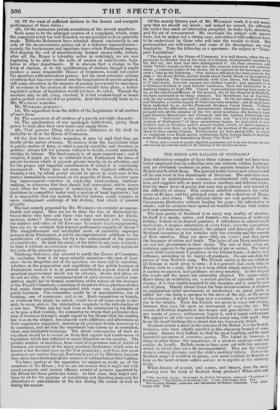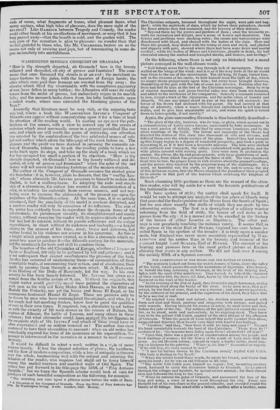THE SONGS AND BALLADS OF SCOTLAND.* THE industrious compiler of
these three volumes could not have been better employed than in collecting into one uniform edition, handsome and yet extremely moderate in price, the popular remains of Scottish Ballad and Scottish Song. The general reader knows now where to find all he can want in this department of literature. The materials were scattered in multitudinous volumes, overburdened with antiquarian lore, and supplied with so many various readings and different copies, that the mere lover of poetry and song was perplexed and wearied by the difficulty of choice. This copious selection embraces the entire songs of BURNS, and the principal songs in the collections of HfiltD, RAMSAY, and others. The editorial duties are well performed: Mr. CHAMBERS illustrates without loading his page ; his information is ample; and he seems to have spared no trouble to obtain both written and oral communications.
The lyric poetry of Scotland is in every way worthy of attention. In itself it is manly, native, and homely—the language of truth and feeling ; it deals in no fancied passions, it introduces no school-taught mythology, it despises affectation of every kind ; even the conventions of rank and state are overlooked ; the earnest and downright Muse of Scotland recognises in her votaries only the sincerity and the warmth of their emotion. They are men—they are lovers ; and they speak the language of nature and truth. The lyrics of our Doric neighbours are not less preeminent in their music. The airs of their songs are unfailing appeals to the passions whether of joy or sorrow. The test of music is the excitement it produces in the human frame; it melts, or it inflames, according to its degree of goodness. No one can deny the power of true Scottish song.-The French nation is the one which in all Europe is most given to song ; it is a proverb that every thing ma France ends in a song. But it is a song which simply moves to gaiety; it excites no passion, and produces no deep emotion. In this respect the words and the music are admirably adapted. The mile simply floats along an undulating air, a certain portion of agreeable prose in rhyme; it is thus readily adapted to any occasion, and is scarcely ever out of place. Hardly raised above the tone of conversation, it requires no preparation either mechanical or intellectual : no grand piano is called for—the thing is apropos to the news of the day, or the gossip of the evening ; it might he sung oyer a counter, or at a casual meeting in the streets. Thus the French are given to songs and singing, because they have hit upon an instrument of every-day use. The source of Scottish inspiration lies deeper and goes further ; its words are words of power; enthusiasm begets it, and it begets enthusiasm. We appeal to ell who have heard Scotch songs sung with spirit : they leave the heart thrilling like a chord that has been newly struck.
England claims a share in the honours of the Ballad; it is the Scotch, however, who have chiefly excelled in this charming branch of composition. Among their ballads we find the most touching and the most beautiful specimens of narrative poetry. The ballad is, however, a thing of other times : the impatience of a modern auditory could not endure its length. Ballads seem to have gone out with the spinningwheel, to which they are a fit accompaniment. They are the ancient dame's solitary pleasure, and the child's soothing lullaby. N ot so the Scottish song—it is still in its prime, and must continue to flourish es long as the heart of man suffers sorrow or is capable of the elasticity of joy. What dreams of scunds, and scenes, and images, does the mere (dancing over the book of Scottish Song produce ! What odds and
* The Scottish Songs; illustrated by Robert Chambers, author of "Traditions of Edinburgh," "The Picture of Scotland," &c. 2 vols., Edinburgh, 1829. Tait. The Scottish Ballads; collected and illustrated by Robert Cbambere. 1 vol. Edit,' burgh, 1829. Tait. ends of verse, what fragments of tunes, what pleasant faces, what merry sayings, what high tides of pleasure, does the mere sight of the airs meal ! Like GARRICK between Tragedy and Comedy, the reader could either laugh at his recollections of merriment, or weep that it has long passed away—that the hearth is cold, and the garden wild. The very pain of the sensation is akin to pleasure: no wonder then that we feel grateful to those who, like Mr. CHAMBERS, bestow on as the means not only of reviving past joys, but of transmuting in some degree melancholy into mirthfulness.



















 Previous page
Previous page